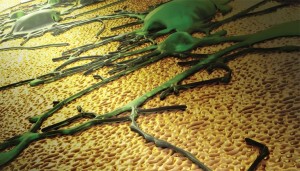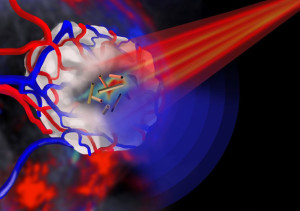
Nanoporous gold features high effective surface area, tunable pore size, and high electrical conductivity and compatibility with traditional fabrication techniques.
Image: Ryan Chen/LLNL
Researchers from Lawrence Livermore National Laboratory and the University of California, Davis have recently published a paper showing that covering an implantable neural electrode with nanoporus gold could potentially eliminate the risk of scar tissue forming over the electrode’s surface.
Two former ECS member, Erkin Seker and Juergen Biener, were among the researchers involved with this development.
This from Lawrence Livermore National Laboratory:
The team demonstrated that the nanostructure of nanoporous gold achieves close physical coupling of neurons by maintaining a high neuron-to-astrocyte surface coverage ratio. Close physical coupling between neurons and the electrode plays a crucial role in recording fidelity of neural electrical activity.


